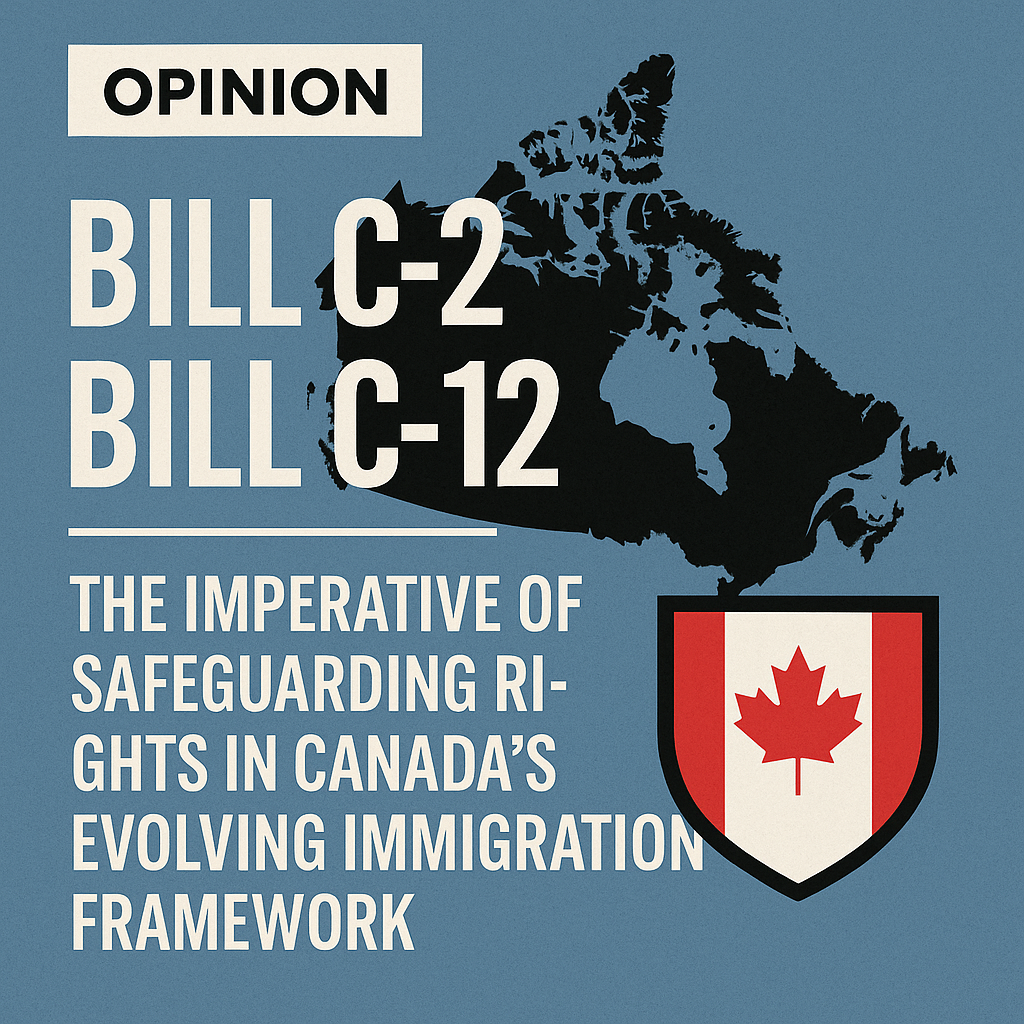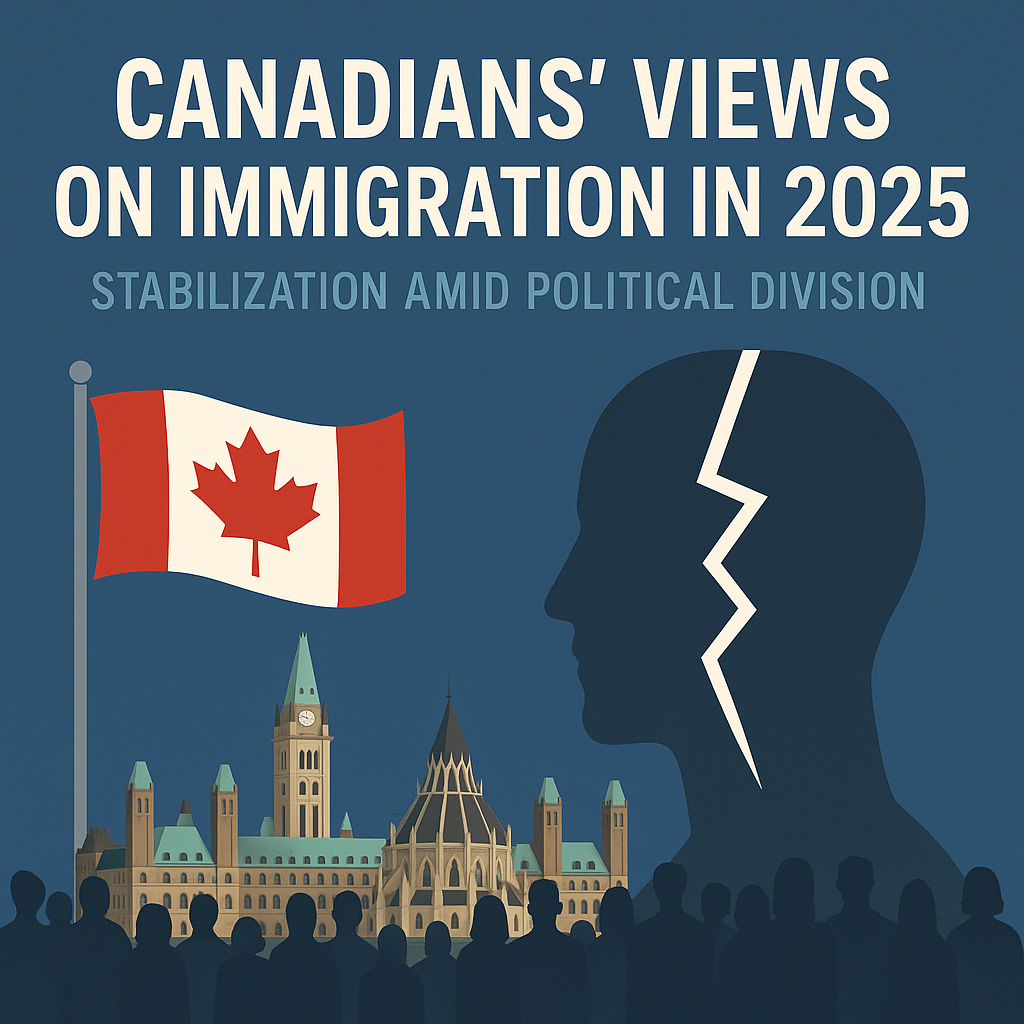Opinion Bill C-2 and Bill C-12 — The Imperative of Safeguarding Rights in Canada’s Evolving Immigration Framework
The recent introduction of Bill C-2 and Bill C-12 marks a significant evolution in Canada’s immigration and border-security landscape. While both legislative initiatives aim to enhance border integrity and address emerging security concerns, they also raise profound legal and constitutional questions that demand careful scrutiny.
What the Bills propose
Bill C-2
Originally introduced in June 2025, Bill C-2 — titled the Strong Borders Act — is a broad omnibus bill encompassing border security, immigration enforcement, surveillance measures, financial regulation, and inter-agency information sharing.
Key features include:
- Expanded powers under the Immigration and Refugee Protection Act (“IRPA”) for the government to cancel, suspend or modify immigration documents (work permits, study permits, permanent‐resident cards, temporary resident permits etc.), or to halt acceptance of new applications, on grounds of “public interest”.
- A new ineligibility regime for asylum/refugee claims: for instance, persons entering after 24 June 2020 who delay filing a claim beyond one year may become ineligible for regular refugee hearings and instead be diverted to a more limited “pre-removal risk assessment” (PRRA) process.
- Significant expansions of surveillance, data‐sharing and disclosure powers: for example, amendments that authorize a Minister (Citizenship & Immigration) to disclose personal information to other federal/provincial agencies, or to obtain subscriber information and transmission data from telecom / digital service providers under certain circumstances.
- Amendments to the Customs Act and Proceeds of Crime (Money Laundering) and Terrorist Financing Act (PCMLTFA), the Controlled Drugs and Substances Act (CDSA) and other statutes, designed to respond to cross‐border crime, illicit drug trafficking (e.g., fentanyl precursors), export controls and financial crime.
These broad changes triggered strong opposition from civil society and refugee/migrant rights organizations, who argued that the bill erodes fundamental rights under the Canadian Charter of Rights and Freedoms and Canada’s international refugee-law obligations. Canadian Council for Refugees
Bill C-12
In October 2025, the government introduced Bill C-12 (formally titled the Strengthening Canada’s Immigration System and Borders Act).
The government describes it as a more focused or streamlined legislative framework: “to enable Parliament to pass these priorities … while permitting additional time to evaluate the other measures announced in June 2025.”
Key elements of Bill C-12 include:
- Modernized powers for border, immigration and law-enforcement agencies to “be more effective now and in the future” in managing immigration and border systems.
- Provisions allowing for cancellation, suspension or amendment of immigration documents, and stopping or suspending new applications, with improved information-sharing among the Immigration, Refugees and Citizenship Canada (IRCC) and federal/provincial/territorial partners.
- Continued emphasis on immigration control as part of a security-frame-work: for example, managing “surges” in asylum claims, streamlining decisions, strengthening the immigration system’s integrity.
- Some of the more controversial provisions from Bill C-2 have reportedly been removed or deferred in Bill C-12 (for example the “lawful access” provision to telecommunications data and mail inspection, and a proposed ban on large cash donations/transactions over $10,000).
Nevertheless, critics argue that Bill C-12 retains many of the most serious immigration enforcement and refugee-rights limiting measures of Bill C-2.
Legal and Rights-based Implications
At our firm, we recognize the legitimate objective of ensuring border integrity and national security. However, these goals must be pursued in a manner consistent with constitutional protections, fundamental justice and Canada’s international legal commitments.
Key red flags and areas for monitoring:
- Due process and procedural fairness
The power to cancel, suspend or modify immigration documents or applications en masse, on a “public interest” basis, without individualized assessment, raises serious concerns about fairness and the right to be heard. Similarly, limiting access to full refugee hearings (e.g., delaying beyond one-year bar) means claimants may be diverted to a PRRA process that has far lower approval rates. These raise questions under section 7 (life, liberty, security of the person) and section 15 (equality rights) of the Charter, as well as international refugee law protections (e.g., non-refoulement). - Privacy and information/disclosure powers
The expansion of data-sharing and disclosure powers among federal, provincial and possibly foreign agencies triggers section 8 (unreasonable search and seizure) and section 12/13 (cruel and unusual treatment) concerns. For example, the acknowledgment that Bill C-2 is intended in part to enable ratification of the Second Additional Protocol to the Budapest Convention on cyber-crime, raises questions about cross-border access to subscriber/transmission data. In Bill C-12, while some of those provisions were removed, the underlying architecture of enhanced information-sharing remains. The challenge for counsel will be to monitor how these new powers are operationalized: what thresholds (“reasonable suspicion”, warrant, etc) apply, how oversight is maintained, and whether ministerial discretion is unbounded. - Refugee, asylum and international law obligations
Canada has obligations under the 1951 Refugee Convention and the Convention against Torture, including the principle of non-refoulement. Critics including Amnesty International Canada warn that the asylum-claims restrictions in these bills undermine those commitments.
Examples: A retroactive bar for claims made more than one year after entry, removal of “designated countries of origin” regime (in Bill C-2) or imposition of mass document cancellation powers without hearings. Legal counsel must consider whether these reforms could lead to Canada being in breach of its international refugee law obligations, and whether Charter rights are engaged. - Role of Ministerial discretion and broad public-interest tests
The use of “public interest” as a standard for sweeping document suspension or cancellation gives significant latitude to executive discretion. Without strong safeguards (notice, reasons, representation, review), this poses major rights risks. As one civil-society network put it: “Bill C-2 is the expansion of a deportation machine … sweeping new powers to cancel immigration status without individual evaluation.”
Monitoring how these powers are drafted in regulation and deployed will be critical.
Our Firm’s Role — At Gerami Law
We believe that border security and human rights protection are not mutually exclusive. Canada’s legal framework must reflect both its commitment to national security and its obligation to uphold human dignity and the rule of law.
Accordingly, we will:
- Monitor the implementation of these legislative measures to ensure compliance with our clients’ Charter rights and Canada’s international human rights obligations.
- Challenge any administrative or legislative actions that unjustifiably limit the rights of any refugees, migrants, or permanent residents we serve.
- Monitor the use of surveillance and enforcement powers to protect the privacy rights of our clients — ensuring transparency, accountability and minimal intrusion.
Closing Thoughts
As these bills advance through Parliament, legal vigilance and principled advocacy will be essential. While the government’s objectives – securing borders, combating organised crime, countering illicit drug flows – are valid, they do not justify sweeping reforms that undermine due process, weaken international protections, or erode privacy rights.
In the months ahead, we must ensure that the integrity of Canada’s immigration system is strengthened with rights, not at their expense.
Canadians’ Views on Immigration in 2025: Stabilization Amid Political Division
The Environics Institute’s Focus Canada 2025 survey offers an illuminating snapshot of how Canadians are feeling about immigration and refugees in a year marked by global uncertainty and domestic change. Conducted in partnership with Toronto Metropolitan University’s Diversity Institute and supported by the Century Initiative, the study surveyed 2,004 Canadians between September 8 and 21, 2025, with a margin of error of ±2.2%.
A Challenging Year for Canada
For decades, immigration has been a cornerstone of Canada’s demographic and economic strategy, offsetting aging populations and labour shortages. In 2025, this policy imperative continues—but not without tension. The rapid growth in both permanent and temporary residents has generated debates about Canada’s absorptive capacity, housing affordability, and government management.
The broader geopolitical landscape has also shifted. The return of Donald Trump to the U.S. presidency has strained Canada–U.S. relations, influencing trade, security, and migration cooperation. Domestically, a newly elected Liberal Prime Minister faces the daunting task of maintaining public confidence while responding to calls for reform in immigration and refugee management. Canadians are increasingly asserting an independent stance in foreign and economic policy, seeking to balance openness with sovereignty and sustainability.
Public Opinion Levels Off
After several years of mounting skepticism, public opinion appears to have stabilized. More than half (56%) of Canadians now believe the country accepts “too many” immigrants—a modest two-point decline from 2024. This suggests not a reversal but a pause in the growing unease witnessed between 2022 and 2024.
Regional Differences
- Quebec continues to express heightened concern, reflecting anxiety over linguistic and cultural preservation.
- Ontario, buoyed by economic growth and urban diversity, has become slightly more supportive.
- Alberta leads in opposition, with two-thirds saying immigration levels are too high—reflecting economic pressures and political conservatism.
- Manitoba and Saskatchewan show a softening of views, potentially due to visible benefits of newcomer contributions in regional labour markets.
This regional mosaic underscores that immigration is not a monolithic issue; it is deeply tied to local economic conditions, political cultures, and demographic realities.
Shifting Concerns: From Numbers to Management
A key finding of the 2025 survey is that Canadians’ primary concern has shifted from cultural or identity-based fears toward questions of governance and capacity. Many respondents now believe that the issue is not immigration itself, but how it is managed and integrated.
The top cited concerns include:
- Housing affordability and shortages, where immigrants are often—unfairly—scapegoated for structural issues in supply and planning.
- Job market competition, particularly in lower-wage and entry-level sectors.
- Strain on public finances and social services, including healthcare and education.
While cultural anxieties—such as fears of losing “Canadian values”—remain, they have become less dominant than in previous decades. This evolution suggests a maturing public discourse, where economic and policy critiques overshadow identity-based resentment.
Pioneering Pathways: Canadian Express Entry Prioritizes STEM Programs
Introduction
In the dynamic landscape of Canadian immigration, the focus on Science, Technology, Engineering, and Mathematics (STEM) programs has emerged as a cornerstone of the country’s economic growth and innovation. Through the Express Entry system, Canada extends a welcoming hand to skilled workers in STEM fields, recognizing their invaluable contributions to driving forward progress in various industries. In this blog, we’ll explore why Canada prioritizes STEM programs in its Express Entry system, the opportunities it offers to STEM professionals, and how aspiring immigrants can leverage their expertise to secure a pathway to permanent residency in Canada.
The Significance of STEM
STEM fields are at the forefront of innovation and play a vital role in shaping the future of economies worldwide. In Canada, STEM professionals drive advancements in sectors such as information technology, engineering, healthcare, and green energy. Their expertise fuels research and development, fosters technological innovation, and addresses pressing societal challenges, making them indispensable contributors to the country’s prosperity and competitiveness on the global stage.
Express Entry: A Gateway to Canada
The Express Entry system serves as the primary pathway for skilled workers to immigrate to Canada. Through a points-based Comprehensive Ranking System (CRS), applicants are assessed based on factors such as age, education, work experience, language proficiency, and adaptability. STEM professionals often possess attributes that are highly valued in the Canadian labour market, including advanced technical skills, innovative thinking, and a global perspective, which can translate into competitive CRS scores.
Why STEM Programs Receive Priority
Canada’s prioritization of STEM programs in the Express Entry system stems from the recognition of the critical role these fields play in driving economic growth, fostering innovation, and addressing emerging challenges. By attracting top talent in STEM disciplines, Canada aims to bolster its workforce, stimulate research and development, and maintain its position as a global leader in innovation and technology.
Opportunities for STEM Professionals
STEM professionals seeking to immigrate to Canada through Express Entry have access to a wealth of opportunities across various industries and provinces. From lucrative job prospects in tech hubs like Toronto and Vancouver to research opportunities in leading academic institutions, Canada offers a vibrant ecosystem for STEM talent to thrive and excel. Additionally, initiatives such as the Global Talent Stream and the Start-Up Visa Program provide avenues for STEM entrepreneurs and innovators to establish and grow their ventures in Canada’s innovation ecosystem.
Conclusion
Canada’s emphasis on prioritizing STEM programs in its Express Entry system underscores its commitment to fostering innovation, driving economic growth, and building a diverse and dynamic workforce. For STEM professionals around the world, Canada represents a land of opportunity, offering a pathway to realize their potential and contribute to a brighter future. By leveraging their expertise, embracing the possibilities, and embarking on the journey to Canadian permanent residency, STEM professionals can play a pivotal role in shaping the next chapter of Canada’s success story.



